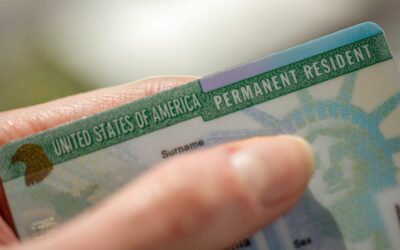Family Petition-Based Immigration
Not every family relationship serves as a basis for obtaining permanent U.S. residency. Also, U.S. citizens and permanent residents of the United States are treated differently when it comes to family immigration petitions. Family-based immigration consists of one “immediate family” category and four preference categories. Immediate Family Members Immigration Law defines “immediate family members” as:
- Spouses
- minor children (under the age of twenty-one), and
- parents of U.S. citizens (if the child is at least 21 years old)
This category of “immediate relatives” is clearly reserved only for immediate family members of U.S. citizens. There is no limit to the number of immediate family visas that can be granted in this category. Spouses In order to obtain available immigration benefits to a “spouse,” there must be a valid, genuine, bona fide marriage between the parties. Generally, marriage is valid for immigration purposes if it is recognized by the law of the state where it occurs. Marriages that are against public policy, such as polygamous or incestuous marriages, are not valid for immigration purposes, even if it is valid in the state where it occurred. Proxy marriages are specifically excluded by the INA, unless the marriage has been consummated. A marriage that has legal validity will not yet be recognized if it is found to have been a marriage of convenience, signed up by the parties for immigration benefits and without any intention of living together as a married couple. Religious ceremonies alone in some jurisdictions cannot create a marriage recognized by immigration authorities. However, if a religious ceremony is only sufficient in the jurisdiction in which it was performed, the marriage is valid. A marriage ceremony can also be valid for immigration purposes, if the parties did so in good faith, believed they married, and lived together as husband and wife. The marriage must be legally in effect at the time the immigration benefit is applied for. The only exception to this requirement applies to certain cases of spouses of deceased U.S. citizens (explained below). A marriage can be considered legally enforceable even if the parties separate, as long as they are still legally married. Courts have generally rejected the view that marriage must be “viable” in order to be entitled to an immigration benefit. It is now the opinion of the immigration administration that marriage-based immigration benefits can be applied for even if the couple is separated, although separation can be considered in determining whether the marriage was in good faith. However, if the couple is legally separated (i.e., by a written agreement recognized by a court or by court order) the alien no longer qualifies as a “spouse” for immigration purposes even if the couple has not obtained a final divorce. A law passed in October 2009 allows the surviving spouse to apply for permanent residency on their own, regardless of the length of the marriage before the death of the U.S. spouse. The petition must be filed within two years of the death of your U.S. citizen spouse (Beware: If your spouse passed away before the passage of this new law, October 28, 2009, your petition must have been filed within two years of the new law or before October 28, 2011). Children The meaning of “child” is not as simple as it seems at first glance. For the purposes of family-based immigration, a “child” is defined as follows:
- a child born in wedlock;
- a stepson provided that the child had not reached the age of eighteen at the time the marriage occurred which created stepson status;
- a child recognized under the law of the child’s domicile, or under the law of the parent’s domicile, whether within or outside the United States, if such legitimation takes place before the child reaches the age of eighteen, and the child is in the legal custody of the probate parent or the parents at the time of his or her legitimation;
- a child born out of wedlock, from whom a privilege or benefit is sought by virtue of the child’s relationship with his or her biological mother or to his or her natural father if the father has or has had a relationship between father and child;
- an adopted child being under the age of sixteen, if the child has been in the legal custody of, and has lived with, the adoptive parents or the parents for at least two years: provided that none of the natural parents of any adopted child shall thereafter, by virtue of such filiation, be granted any rights, privilege or status under this Act; or
- a child, less than sixteen years of age at the time a petition by an immediate family member is made on his or her behalf, who is orphaned because of death or disappearance, abandonment or desertion, or the separation or loss of both parents, or for whom the sole surviving parent is either unable to provide adequate care and who in writing irrevocably releases the child for emigration and adoption; that you have been adopted abroad by a U.S. citizen and spouse jointly, or by an unmarried U.S. citizen at least twenty-five years of age, who personally saw and observed the child before or during the adoption proceedings; or who is coming to the United States for adoption by a U.S. citizen and spouse jointly, or by an unmarried U.S. citizen at least twenty-five years of age, who has or has met the pro-adoptive requirements, if any, of the child’s proposed residence: whenever the Attorney General is satisfied that appropriate care will be given to the child in the event of admission to the United States: On the condition that no natural or previously adoptive parent of the child, by virtue of such parentage, shall be granted any right, privilege, or status under immigration law.
The parent-child relationship must continue to exist at the time immigration benefits are requested. A child includes only one single person under the age of 21. The child must be both single and under the age of 21 at the time the visa is issued by a consulate and at the time he or she applies for admission to the United States. If the child marries or becomes 21 years old after the visa is issued and before he or she applies for entry, he or she is disqualified for immediate family status. The Parents In order to apply to parents within the immediate family category, the U.S. citizen petitioner must be at least 21 years of age. “Father” means a parent who is such by reason of his or her relationship with a “child” within the legal definition of the term. The “child” must have qualified as such within the legal definition at the time their relationship was established and the parent-child relationship must continue to exist at the time the immigration benefit is sought. Family-Based Preference Categories Family-based preference categories apply to immigrants in the family, who are not immediate relatives.
- The first preference category consists of unmarried sons or daughters of U.S. citizens.
- The second preference category has to do with family members of permanent residents of the United States and is divided into two sub-groups, each with a separate waiting list for available visas:
- (a) spouses and minor children of permanent residents, and
- (b) unmarried sons or daughters (but not their sons) of permanent residents.
- A son or daughter of a married U.S. citizen falls under the third preference category.
- The fourth preference category allows U.S. citizens over the age of twenty-one to petition their brothers and sistersfor permanent residency.
These preference categories are subject to annual visa limits. This means that there are visa delays in some preferences. Available visas are issued to beneficiaries in order for their priority date, which is the date the petition for permanent residence was filed. Preference categories for family members of permanent residents have longer delays than preference categories for family members of U.S. citizens. In addition, India, Mexico and the Philippines have a higher demand for immigrant visas and are subject to country-specific annual limits. Country of birth is relevant rather than citizenship. For example, Canadians originally born in one of these countries will be placed on the waiting lists of their country of birth. Priority dates don’t necessarily progress in real time. For example, although the order list for the fourth preference may be 10 years, the actual wait is much longer. The progress of priority dates often varies. In fact, as the end of each fiscal year (September 30) approaches, it’s not uncommon to see a delay in the priority date. This is done to keep visa issuances within the annual numerical limitation. Status Derived To Spouses And Children From Family Petitions The category of immediate relative does not normally confer derivative status on a spouse or child of an immediate relative. In other words, the spouse or child of an immediate relative does not automatically acquire permanent residency when the principal applicant obtains that status. The only exception is for the children of the widow or widower of a U.S. citizen. Although you cannot obtain derivative status, some family members of an immediate relative may be entitled as an independent immediate relative. For example, a child of the primary beneficiary who is under the age of 18 at the time of the marriage of the principal beneficiary to the petitioner qualifies as a stepson. A separate visa petition must be filed by each immediate relative. Conversely, the spouse or child of an immigrant by preference accompanying or following to meet, is entitled to the same category and the same order of consideration as the principal immigrant. The classification derived from such a spouse or child joins immediately after the approval of the classification of the main beneficiary and does not require a separate visa petition. Conditional Permanent Residence In The Case Of Recent Marriages A permanent residence conferred on an immigrant based on a marriage less than two years old at the time the person obtained that status is subject to the laws of the Immigration By Marriage Fraud Amendments of 1986. These people are given conditional and non-permanent residency. The petitioner and beneficiary must file together a petition to change the residency condition to a permanent residence within 90 days before the second anniversary of receiving conditional residency. If the petitioner and the beneficiary cannot file the petition together within the 90-day period, they must file that application with a “waiver” for having submitted the petition late to avoid loss of resident status. Conditional status waivers are available in the following situations:
- Extreme Hardship – A waiver for not being able to apply together may be granted when the non-citizen spouse can show that he or she would suffer “extreme hardship” if deported from the United States. This waiver is requested when the citizen or permanent resident fails in or refuses to join the petition to change from conditional to permanent residence. The regulations state that while any expulsion from the United States is likely to result in some degree of hardship, only in those cases where the hardship is extreme should the request for forgiveness be granted.
- Termination of Marriage – To be entitled to this exemption, the conditional resident must prove that he or she entered the marriage “in good faith,” that the marriage was legally terminated, and that the non-citizen is “not at fault” in failing to meet the joint petition requirement. The person may also apply for a waiver of termination of the marriage where the couple has filed for divorce, but the marriage is not legally terminated, although the waiver cannot be approved until the marriage is legally terminated (divorce.)
- Battered Spouse OR Child – An exemption from the joint petition requirement is granted if the conditional resident entered the marriage “in good faith,” but during the marriage the non-citizen spouse or a child was abused or subjected to extreme cruelty by the citizen or resident. The non-citizen must also show that he or she was not at fault for failing to comply with the joint petition requirement.
- The Death of the U.S. Citizen A conditional resident may apply for a waiver of the joint application requirement if the non-citizen entered the marriage in good faith, but the U.S. citizen or permanent resident subsequently died. While the conditional resident must still present evidence to prove that the marriage was in good faith, it is not necessary to demonstrate extreme hardship.





